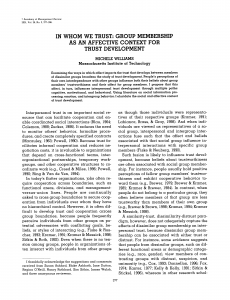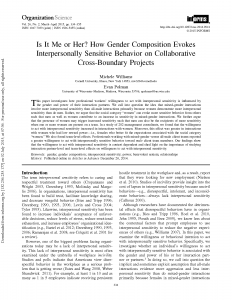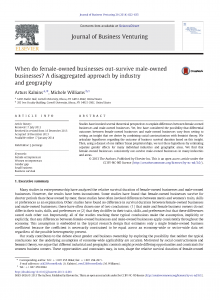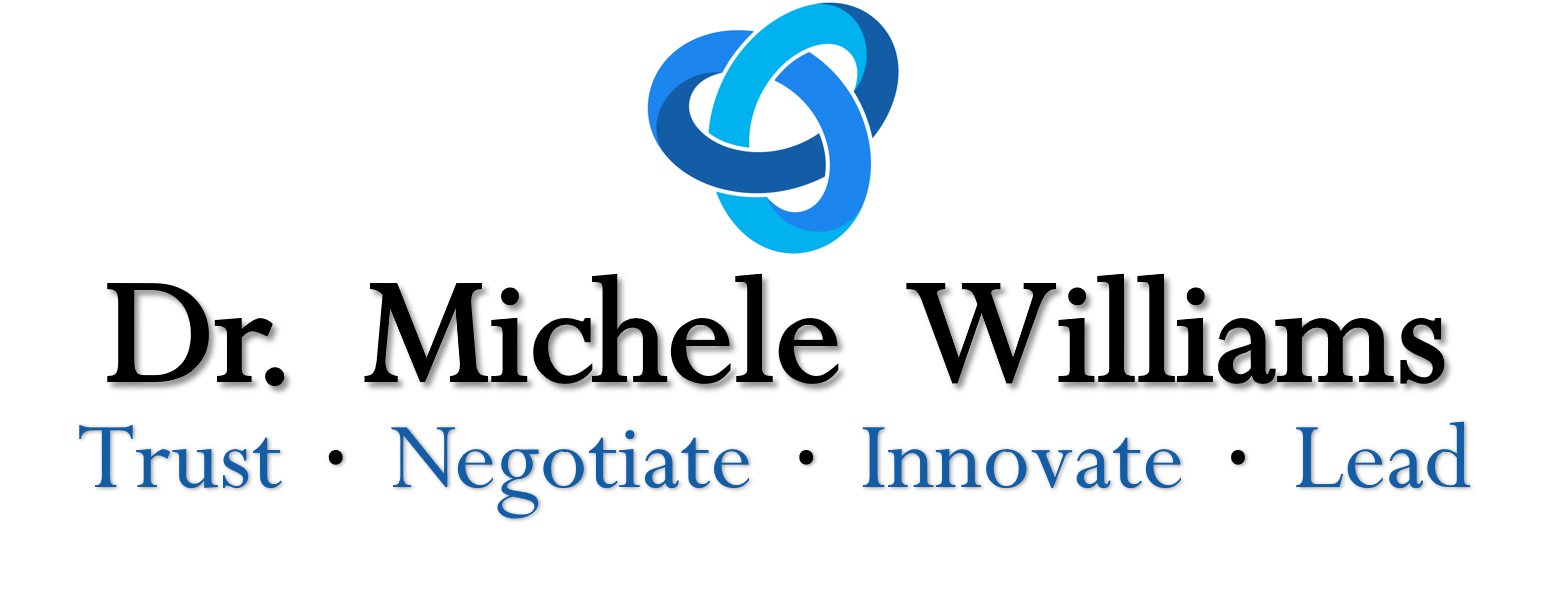Publications



RC Mayer, M Williams (2021). Multilevel trust in uncertain contexts. Understanding Trust in Organizations: A Multilevel Perspective, 3(1), 6-24. Download
Williams, Michele, Belki, L, and Chao, C. (2020). “Cognitive Flexibility Matters: The Role of Multilevel Positive Affect and Cognitive Flexibility in Shaping Victims’ Cooperative and Uncooperative Behavioral Responses to Trust Violations.” Group & Organization Management,45.2 (2020): 181-218. Download
Williams, M. (2015). Affect, emotion and emotion regulation in the workplace: Feelings and attitudinal structuring. Negotiation Journal, 425-428. Download
Williams, M. & Polman, E. (2015). Is it me or her? How gender composition evokes interpersonally sensitive behavior on collaborative cross-boundary projects. Organization Science, 26(2): 334-355. Download
Waber, B., Williams, M., Carroll, J. & Pentland, A. (2015). A voice is worth a thousand words: The implications of the micro-coding of social signals in speech for trust research. In F. Lyon, G. Möllering, M. Saunders and T. Hatzakis (Eds.) Handbook of Research Methods on Trust: 2nd Edition. UK: Edward Elgar Publishing. Download
Williams, M. & Emich, K.* (2014). The experience of failed humor: Implications for interpersonal affect regulation. Journal of Business and Psychology, 29(4): 651-668. Download Carroll, J.,
Williams, M. & Gallivan, T. (2012). The ins and outs of nursing change of shift handoffs: A communication challenge. British Medical Journal: Quality & Safety, 21(7): 586-93. Download
Williams, M. (2012). Building and re-building trust: Why perspective taking matters. In R. Kramer, & T. L. Pittinsky (Eds.), Restoring Trust: Enduring Challenges and Emerging Answers. New York: Oxford University Press. Download
Williams, M. (2007). Building genuine trust through interpersonal emotion management: A threat regulation model of trust and cooperation across boundaries. Academy of Management Review, 32(2), 595-621. Download
Williams, M. (2001). In whom we trust: Group membership as an affective context for trust development. Academy of Management Review, 26(3), 377-396. Download
M Williams, M Ghorbani, A Kalnins (2023). Moving to the Big City: Temporal, Demographic, and Geographic Influences on the Perceptions of Gender-Related Business Acumen among Male and Female Migrant Entrepreneurs in China. Academy of Management Discoveries, 9(2), 117-124. Download
HJ Li, XC Wang, M Williams, YR Chen, J Brockner (2023). My boss is younger, less educated, and shorter tenured: When and why status (in) congruence influences promotion system justification. Journal of Applied Psychology, Download
A Kalnins, M Williams (2021). The geography of female small business survivorship: Examining the roles of proportional representation and stakeholders. Strategic Management Journal, 42(7), 1247-1274. Download
Williams, M. (2016). Being trusted: How team generational age diversity promotes and undermines perceived trust in cross-boundary relationships. Journal of Organizational Behavior, 37(3): 346-373. Download
Williams, M. & Polman, E. (2015). Is it me or her? How gender composition evokes interpersonally sensitive behavior on collaborative cross-boundary projects. Organization Science, 26(2): 334-355. Download
Kalnins, A. & Williams, M. (2014). When do female-owned businesses out-survive male-owned businesses? A disaggregated approach by industry and geography. Journal of Business Venturing, 29 (6): 822-835. Download
Williams, M. (2001). In whom we trust: Group membership as an affective context for trust development. Academy of Management Review, 26(3), 377-396. Download
M Williams, M Ghorbani, A Kalnins (2023). Moving to the Big City: Temporal, Demographic, and Geographic Influences on the Perceptions of Gender-Related Business Acumen among Male and Female Migrant Entrepreneurs in China. Academy of Management Discoveries, 9(2), 117-124. Download
Kalnins, A. & Williams, M. (2014). When do female-owned businesses out-survive male-owned businesses? A disaggregated approach by industry and geography. Journal of Business Venturing, 29 (6): 822-835. Download
